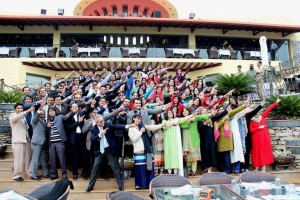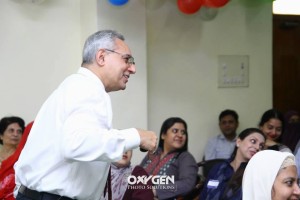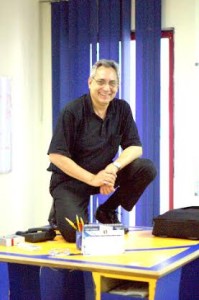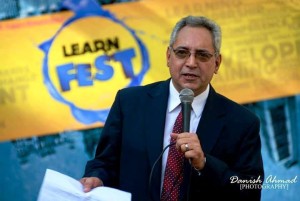You pioneered the learning & development and organizational development movement in Pakistan in 1991, has the momentum you have created surpassed your expectations?
Kamran Rizvi: “Yes, it has. The learning and development industry is flourishing in the country. It is attracting new talent and today we have hundreds of firms and individuals who are running learning programs for youth and the corporate sector. Within a day of my return from the United Kingdom after 20 years, my cousin suggested that I go into the field of training and development. He was aware that in my last assignment with BCCI in London had been as head of training. I was hesitant at first, since whoever I asked in my earlier visits to Pakistan, told me that people in Pakistan were very fond of teaching, but very few actually wanted to learn. However, my cousin’s encouragement was persistent and I decided to take on this agenda. My aim was to reach out to all human beings in the urban and rural settings, rather than restrict the scope of this work to developing leadership and managerial capability in the corporate sector. I did not have a vivid dream or a vision for this, but I had a passion to serve, an inner calling, so to speak. I was just fortunate to have pioneered this movement, which should have started at the very inception of our country.
When I first started there were around a dozen names in the industry. The most prominent amongst them were Mian Ghani, Abdul Wahid Khan, Zarrar Zubair, Philip Lal and Inam Mustafa Kamal. The latter three were associated with Pakistan Institute of Management. At the time, training and development activities were viewed as a luxury, available to the few. Of course, training was provided to military personnel and bureaucracy, but members of civil society had little or no access to behavioral and competency-based training.”
As founding director of the School of Leadership, do you believe that youth leadership training and capacity building among young people should be integrated into their academic curriculum?
KR: ”Absolutely! Leadership training must be made mandatory in all schools, colleges and universities throughout the country. Young people, in particular, are full of energy. What they need most is the ability to think freely and responsibly, while setting a direction for themselves and acting wisely. It is only when people are given the opportunity to become more aware of who they are and what their purpose in life is that they are able to tap their infinite potential to make a positive difference in their own lives and in society at large. Our biggest enemy is and has been a lack of awareness. Even though School of Leadership (SoL) surfaced in 2002, its seeds were sown in 1991, with the aim of reaching out to our youth. Thankfully, learning and development opportunities are now being provided to all segments of our society
We started our work with youth (14-17 years of age) in 1992 through our program called the ‘Life Skills Workshop’. Froebels in Islamabad was the first school where we initiated this. Students were taught how to set goals, manage time, improve their relationships with parents, teachers and peers and get the most out of their time at school. Shireen Naqvi joined us in 1996 and strengthened our mission. She shared in our dream. Even though we serve the corporate sector, and have been doing so since 1991, we simultaneously focused on youth leadership by developing relevant programs young adults. 
Shireen was inspired by a program she came across in New York called GYLC (Global Young Leaders’ Conference). It was her dream to organize a similar conference for our youth in Pakistan. She consulted a few stakeholders in the country, which included Javed Jabbar. She was encouraged by her findings and found plenty of support for the idea. As a result, we launched the Young Leaders’ Conference (YLC) in 2002, which led to the creation of the School of Leadership (SoL) in the same year, in order to sustain this initiative. SoL is ‘for the youth, of the youth and by the youth.’ It is led and managed by our youth who are mentored by Shireen, Saima and myself a.k.a., ‘SoL’s Trio’. YLC is now in its 12th year and we have around 6,000 YLC alumni all across the country. They are making a positive difference in their respective spheres of influence, impacting millions of lives. YLC alumni are present in over fifty locations in all provinces of Pakistan – they are active in big cities like Karachi, Lahore, Islamabad, Rawalpindi, Faisalabad, Peshawar, Quetta, Hyderabad, and in Kohat, Nasirabad, Muzaffarabad, Swat, Sahiwal, Sialkot, Faisabad, Gilgit Baltistan, FATA etc.”
What elements do you believe are vital for the youth of Pakistan to be successful leaders?
KR: “Followership is as important as leadership! A good leader is also a good follower. As a ‘follower’ what do we follow? Is it our egos? Is it what others tell us and we readily comply unthinkingly? Or is it ideas that we consider with an open mind, consciously process them in our heads and accept only those that we believe are good for us and for those around us? I hope the latter is true. To become inspiring leaders we need to rid ourselves of conceptual muddles, low self-esteem and half-truths. Instead, we need to discover ourselves, step out of our comfort zones, believe in ourselves, celebrate life, question certain traditions that are holding us back from progress and civility, and turn knowledge into wisdom.
Most of us are victims of half-truths, e.g., we have learned that it is good to be happy with what we have, but we have forgotten that it is equally important to also strive for excellence in everything we do. We pride ourselves in having family values and have conveniently lost sight of community values. We have driven ourselves to despair and apathy in the face of mounting social and political problems, forgetting that problems are only opportunities in disguise, and hence to be positive and hopeful. We claim belief in God, but have little or no regard for humanity at large. We talk of freedom and ignore the need for discipline in our lives. Half-truths are worse than lies.
High levels of unemployment make no sense in a land like ours, which is brimming with opportunities. Entrepreneurship is the biggest opportunity in Pakistan today because there is so much to be done. Rather than just learning to become employees, our youth also needs to think in terms of becoming employers and problem-solvers. The bigger the problem we take on, the more we grow in capability and impact. We often hear about lack of resources. What we fail to realize is that our biggest resource is behind our eyes and between our ears — our brain! Our brain can be likened to a ‘thought factory’ with infinite capabilities to produce ideas of value. All it needs is the raw material (problems we choose to solve). It is only by embracing challenges that we generate limitless ideas of value, innovate, grow and excel in our chosen field of endeavor.”
Your inspirational talks for young community leaders are well known. What do you think are the reasons for the overwhelming response?
KR: “I think the reason is the power of the ideas my colleagues and I communicate in workshops, seminars and conferences. We believe that hope is the driving force of inspired action. It stems from faith, faith in one’s self, faith in the future, faith in others and ultimately faith in God. People respond positively because they discover immense possibilities within and around them. They awaken to what can be. They realize that life is to be lived and that there is so much to be done. Through inspiring stories and case studies, and clear concepts, they strengthen their beliefs and find they have sufficient capacity to pull ourselves out of the doomsday scenario we are surrounded by. It is important to know that hopelessness is kufr (denial of reality).
We have to emerge out of the darkness of ignorance, and move into the light of hope which comes from faith. Once hope has been kindled, it fuels our dreams. Nelson Mandela had a dream. Martin Luther King had a dream. Allama Iqbal had a dream. We too must dream of a better tomorrow for ourselves, and for all those we care for. Muhammad Ali Jinnah was an inspired man who is known to have turned Iqbal’s dream into reality.”
Your books have been well received, what prompted you to start writing?
KR: “I made a commitment to myself in 2004 to write management and leadership articles every month. I am glad that Blue Chip magazine publishes them. I felt that I should practice what I preach, which is to step out of my comfort zone. It is the only way to develop and grow oneself. I am not particularly fond of writing. I discovered that in order to write, one has to do plenty of reading, and also be observant. I saw reading as a useful habit to acquire for my own growth. I had previously flirted with the idea of writing, I wrote for The News on a few occasions in 1994/5.
I realized that I am going to pass away one day, so why not leave some thoughts in print. This way, even if I am not around physically, at least my thoughts will be available to all those interested. All I do is to present my perspective to everyday life issues and challenges. I am encouraged by the fact that my audience is moved to action by them. I now write, because I know that these thoughts are making a difference. In 2010 I made a public commitment that I shall write a book every year. This has been tough, but rewarding. My books are not commercial ventures for me. They are just a means to communicate my thoughts to a larger audience and this had been made easier, thanks to the internet. These are available for free in pdf on www.kzr.co. I continue to write for Blue Chip as those who read the magazine are mostly decision makers who impact millions of lives. We need to be inclusive when it comes to sharing knowledge.”
You have attended a number of courses abroad during your career, including the Leadership for the 21st Century, at the JFK School of Government, Harvard University. What impact did these experiences have for you?
KR: “I attend international programs in order to keep myself abreast with the latest research and best practices in the field of leadership and management. We need to constantly interact with people from a variety of cultures and traditions to widen our network and broaden our vision. My father has been instrumental in ensuring that I keep exposing myself to standards higher and better. I have particularly enjoyed attending the World Business Forum in New York twice in 2010 & 2011. Leadership for the 21st Century was held at the J F K School of Government, Harvard University in 1997. It was a 6 day program in which I was amongst 60 participants from 22 countries. They included senior managers and leaders from the voluntary, corporate, government and social sectors. I found Prof Ron Heifetz the most inspiring in their faculty. What I learned from the program was that the biggest challenge I faced was not outside of me, but within me!”
What causes you to believe that self-promotion is a perilous pursuit?
KR: ”Need for self-aggrandizement and self-promotion is an ugly manifestation of our ego. Excessive sense self-importance blinds us to new knowledge and makes us aloof of ground realities. Such a tendency attracts sycophants who seduce us into believing that all is well, when that is not the case. History is replete with tragic examples of military and political leaders whose end was tragic and a lesson for us all.” We are not the ‘source’ of anything, whether it is knowledge or employment. To behave in this fashion is foolish – indeed, it is delusional and wreaks or arrogance. We are merely a ‘medium’ for the knowledge and insights that flow through us. The ultimate source of everything we enjoy and benefit from is God. This realization engenders humility in us. Humility is the crucible in which all wisdom resides. Humility makes us receptive to what is. It helps us connect with ourselves and also to relate to the wider humanity with respect. I constantly remind myself that I am a student in the business of teaching and not just a teacher. Because if I say that I am a teacher, it means that I only teach, so when do I learn?
Jim Collins articulates this best when he says that great leaders are imbued with humility, while remaining passionately vocal about their cause. Such leaders don’t see others as less than them. Instead, they view others as partners and associates who share in the dream. It is a fallacy to yearn for a leader to emerge and rescue us from our plight. We are not suffering from a crisis of leadership, but a crisis of awareness. No one individual can come and save us. To bring real and lasting change, we need to educate and empower people to display leadership in their respective spheres of influence with a sense of responsibility to a shared vision.
Pakistan was built on technical know-how but what we lacked from the very start was wisdom, i.e., making correct use of the knowledge we have. Since 1947, we have seen the blatant misuse of power, neglect of the poor, and preservation of the status quo at the cost of progress. We have not converted our talk into deeds that benefits all citizens. We have wantonly mismanaged resources and paid lip-service to our creed. We have been irresponsible. We have lacked managerial and leadership competence, shaped by values such as integrity, respect for people, discipline, innovation etc., that makes champions out of people. At last, we are beginning to learn that cosmetic changes will not do. We need to change our paradigms. Achieving greatness is not a function of acquiring size, status, assets, and power. Instead, it is about significance, meaning and purpose. There is no need to promote self, when a great idea can make the difference.”







